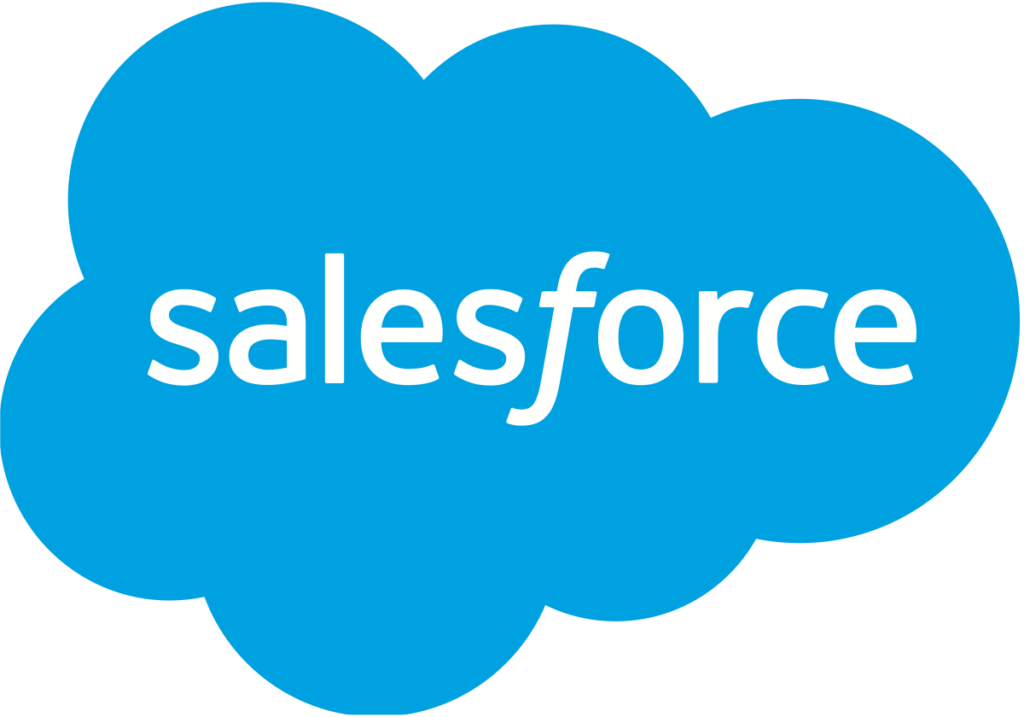Are you looking for a Salesforce alternative?
When it comes to old economy sectors, most people are looking for the best solution for their specific circumstances, such as manufacturing lead generation or logistics sales automation.
Today, we’ll cover the five CRM alternatives to Salesforce that can get up and running quickly, with minimal transitional pain and none of the headaches that often come with Salesforce.
What are Old Economy Sectors?
Here’s how Investopedia defines old economy sectors.
“Old economy refers to industries that have not changed significantly despite advances in technology. Climate change and new technologies impact the old economy, but most of the processes have been the same for hundreds of years.”
Based on the definition, we can say the following industries are parts of old economy sectors:
- Transportation
- Shipping and Logistics
- Manufacturing
- Agriculture
- Breweries
- Oil and gas
- Mining
- Automotive
- Chemicals
Old economy industries have established processes. Typically, companies in these sectors are looking for a tool that (a.) works with their existing processes and (b.) gets their team up and running quickly. If you have similar expectations, Salesforce may not be a good fit.
What’s Wrong With Salesforce CRM?
A quick scan of issues.salesforce.com lists 38,424 software problems across 40+ categories. Keep in mind that these are just known issues.
Here’s an overview of some of the most common problems found in the list. Salesforce is…
- Very expensive: their pricing structure can be complex. There are lots of hidden fees—API calls, data storage, and third-party integrations add up quickly.
“As you start using the Salesforce platform for your business operations, you will quickly find that many of the advanced options you seek are not included in the standard plan. You’ll need to start expanding to other clouds or apps available on the AppExchange. […] It is vital to anticipate and budget for the extra costs associated with each of these tools.” — an independent product reviewer.
- Very complex: Salesforce has a steep learning curve. The complexity of their product means their apps are difficult to learn, especially for those who don’t have a technical background.
“It is highly complex, and it doesn’t come with out-of-box customization. For every single feature implementation, u will need a. Consultant. It is only suitable for big call centers provided if they maintain a Salesforce engineering team to create and implement all the features as per the Support department’s requirements.” — a user review on Capterra.
- Unresponsive: When it comes to customer service, customers have stated that Salesforce is unresponsive and unavailable. It’s not uncommon for support requests to go unanswered for weeks or months.
- Difficult to manage: users have reported that they attempted to update a record only to find that their co-worker was updating the same record. Naturally, this creates conflicts and data inconsistencies.
- Difficult to migrate: Salesforce’s platform is proprietary, so migrating to a new CRM can be very difficult, especially once you’ve added all the customizations, add-ons, service packages, and extras.
5 CRM Alternatives to Salesforce
With the frequent hiccups and challenges many businesses have to tackle when using Salesforce, it’s worth considering adopting a better sales CRM solution that offers similar features to Salesforce but without complications. Below, you can find five CRM alternatives to Salesforce.
1. Pipeline CRM: Best CRM for Manufacturing Lead Generation
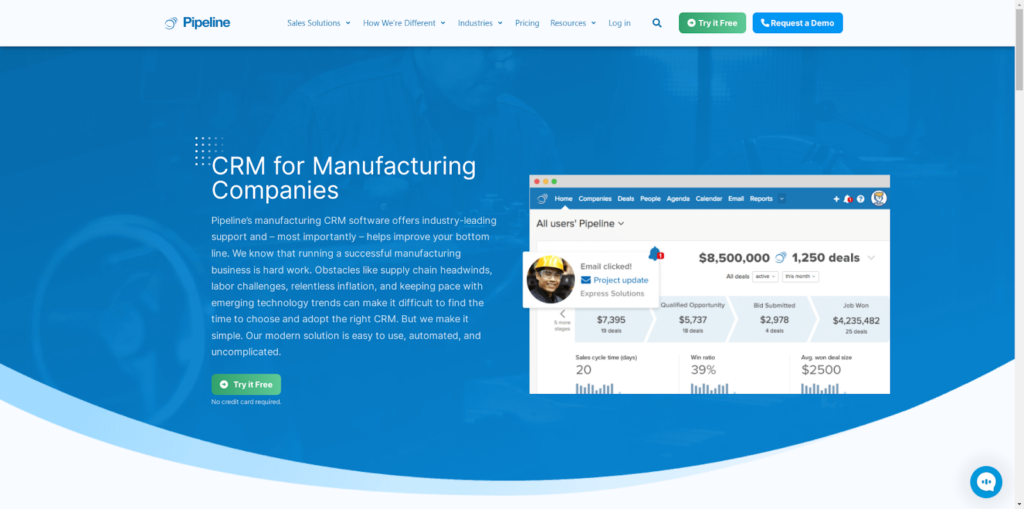
Pipeline CRM is great sales CRM software if you’re looking to replace Salesforce, as it solves the common problems old economy businesses face.
Let’s take manufacturing companies as an example. They’re struggling to retrain an aging workforce and teach them how to use new technology, let alone a complex sales CRM for manufacturing like Salesforce. Additionally, manufacturers must chase down new opportunities, generate leads, and close deals. They’ll need to do this while keeping razor-thin margins in mind, doing what’s necessary to turn a profit.
Have you had a similar experience? If your situation sounds similar, you’ll need:
- A CRM that’s designed for manufacturing lead generation
- Action plans and reminders to chase down new opportunities
- Assistance to build a virtual bench of reliable employees-in-waiting (walk-offs and no-shows are always an issue)
- A CRM system in place that identifies customers who are a fit for your business and are willing to work with your already razor-thin margins
- A platform that shows you why you’re winning or losing deals, opportunities, and people.
Pipeline CRM can deliver them all and more.
Salesforce vs. Pipeline CRM
Designed specifically for old economy sectors, Pipeline CRM is a powerful tool that prioritizes sales acceleration. If your goal is to start winning deals and recruiting top talent quickly, Pipeline CRM is the ideal choice.
Unlike the more general-purpose Salesforce, Pipeline CRM is streamlined for simplicity and automation. This means your sales team can be up and running in minimal time, allowing you to focus on closing deals.
See how Pipeline CRM stacks up against Salesforce in this Pipeline CRM vs. Salesforce comparison page.
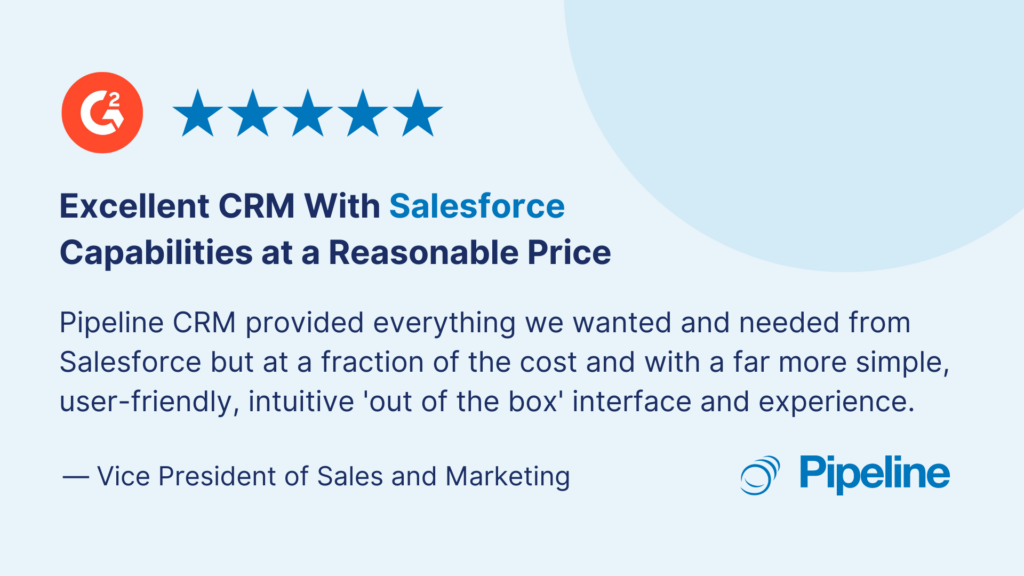
Pros and Cons
- Pipeline CRM is scalable yet very affordable
- Heavily oriented toward selling with extensive sales management automation
- Integrates with a large list of software (e.g., Microsoft, QuickBooks, Google Apps, Zapier, Paycove, CallRail, etc.)
- Best-in-class, industry-leading customer support
- Best for small-to-medium organizations
Reviews
- 4.4/5 star rating on G2 (904 reviews total)
- 4.4/5 star rating on Capterra (616 reviews total)
- 9.8/10 score via TrustRadius
- 4.2/5 star rating via Gartner (41 reviews total)
Pipeline CRM Pricing
- Start plan: $29 per user per month
- Develop plan: $39 per user per month
- Grow plan: $59 per user per month
Related: Managing a logistics business? See some of the best CRM for logistics companies.
2. Syspro CRM: Best for Manufacturers and Distributors
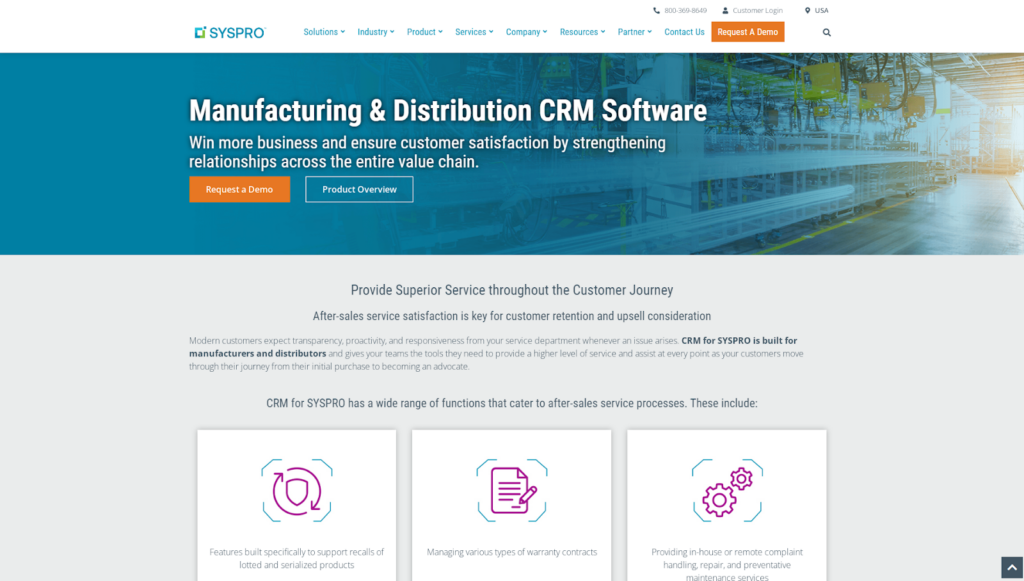
According to their website, Syspro CRM is “built for manufacturers and distributors who rely on loyal relationships up and down the supply chain, efficiency, and quality to be competitive.”
Syspro is a fantastic Salesforce alternative if you’re looking for an end-to-end solution that manages your CRM and other portions of your business (e.g., finance, project management, procurement, etc.). However, if your organization already has a software stack that works for your business and you don’t want to risk changing anything, Syspro may not be a good fit.
Syspro has all of the standard CRM features, but it’s also …
- Designed to manage product recalls for both lotted and serialized products
- Able to handle various types of warranty contracts
- Created for in-house complaint handling, repair, and preventative maintenance sales and support
- Great for managing customer support and automated case management
Pros and Cons
- Syspro is known for its attentive support and regular software updates
- The learning curve can be overwhelming, especially for their navigation. It’s often a challenge for users to get to where they want to go
Reviews
- 4.1/5 star rating on G2 (224 reviews total)
- 4.2/5 star rating on Capterra (101 reviews total)
- 4.2/5 star rating via Gartner (48 reviews total)
- 6.8/10 score via TrustRadius (29 reviews total)
Syspro CRM Pricing
- You’ll need to contact Syspro for a quote.
3. Easi’r: Best for Automotive Manufacturers and Dealers
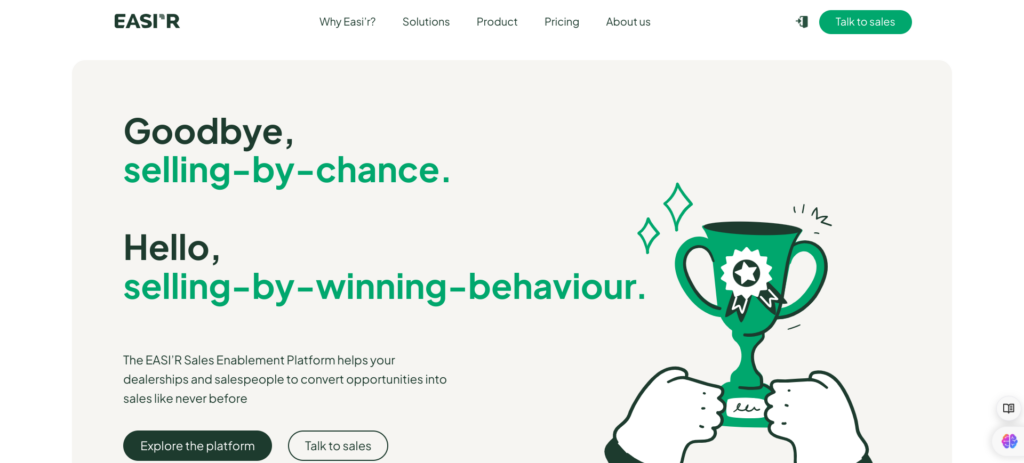
EASI’R is promoted as a “customer relations platform” for the automotive industry. According to its website, it helps automotive manufacturers and dealers close more deals by focusing on “selling-by-winning behavior.” It states that its platform is a sales enablement platform empowering sales teams to do the right things at the right time.
EASI’R breaks its feature set down into six areas:
- Playbook: steps to create a repeatable process manufacturers and dealerships can use to sell more vehicles and services.
- Coaching: sales training, techniques, tips, and tricks to help sales reps stay on track, meet their quotas, and close more deals.
- Conversations: this enables sales reps to build meaningful relationships. They prioritize sharing value and never approach prospects from a purely self-serving attitude.
- Productivity: prioritize the actions, activities, and follow-up sequences sales reps need to close sales.
- Insights: spot trends, forecast activity accurately, and identify the most profitable playbooks.
- Integrations: use their API to create a custom integration that works how you need it, when you need it.
Pros and Cons
- EASI’R is focused on a single industry (automotive)
- Their feature set is optimized around generating leads and closing deals
- Customizable sales processes to optimize sales performance
- Robust performance analytics that specially cater to automotive manufacturers and dealerships
- Integrations require custom coding. No native or ready-made third-party integrations are available
- No on-premise options
- There is no free trial, no free user tier
Reviews
- 5/5 star rating on App Store (3 reviews total)
- –/5-star rating on Capterra
- -/10 score via TrustRadius
EASI’R CRM Pricing
- You’ll need to contact the EASI’R team for a quote.
4. Oracle Netsuite: Best for Medium To Enterprise-Sized Manufacturing Generalists
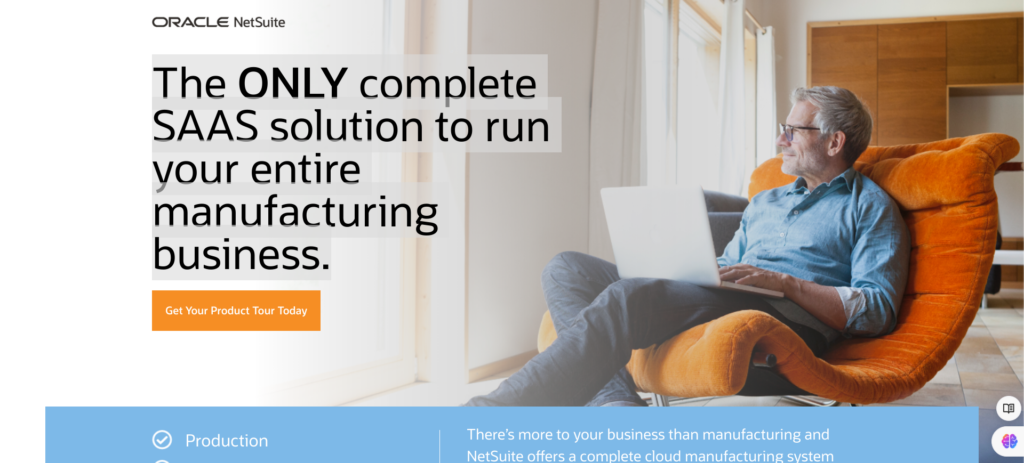
Oracle’s NetSuite claims to be the only end-to-end SaaS ERP for manufacturing companies. With NetSuite, manufacturers can manage all facets of their manufacturing business from A to Z, going beyond the end-to-end management that other ERPs provide. NetSuite is designed for companies that do business internationally. Their platform manages core aspects of manufacturing, including order management and fulfillment, inventory management, demand management, and financial management.
Pro Tip: Not sure what the difference between CRM and ERP is? This CRM vs. ERP blog has the answers.
As a Salesforce alternative, NetSuite might be overkill for small-to-medium companies, but it’s perfect for manufacturing companies looking to scale and grow internationally. Additionally, it could be a great fit for your business if you sell in multiple markets or languages.
Pros and Cons
- NetSuite moves in lockstep with your business, easily scaling up or down as needed
- Heavily oriented towards management. The NetSuite platform operates as a complete solution
- The platform is mature and integrated with a variety of tools (e.g., CRM, financials, inventory, ecommerce, fulfillment, etc.). However, integration with third-party applications can be messy, challenging, and difficult
- Comprehensive customization that enables you to modify the platform to meet your needs
- The cost can be prohibitive for small manufacturers
- Limited support with long wait times before receiving assistance
Reviews
- 4/5 star rating on G2 (3,204 reviews total)
- 4.2/5 star rating on GetApp (616 reviews total)
- 4.1/10 score via Capterra (1,542 reviews total)
- 4/5 star rating via Gartner (41 reviews total)
NetSuite CRM Pricing
NetSuite doesn’t disclose its pricing on its website, but we found the following pricing estimations.
- Average cost per user can range from $100–$300 per month
- NetSuite implementation costs can range from $25,000–$300,000
5. Keap: Best for Direct Response Oriented Logistics Companies
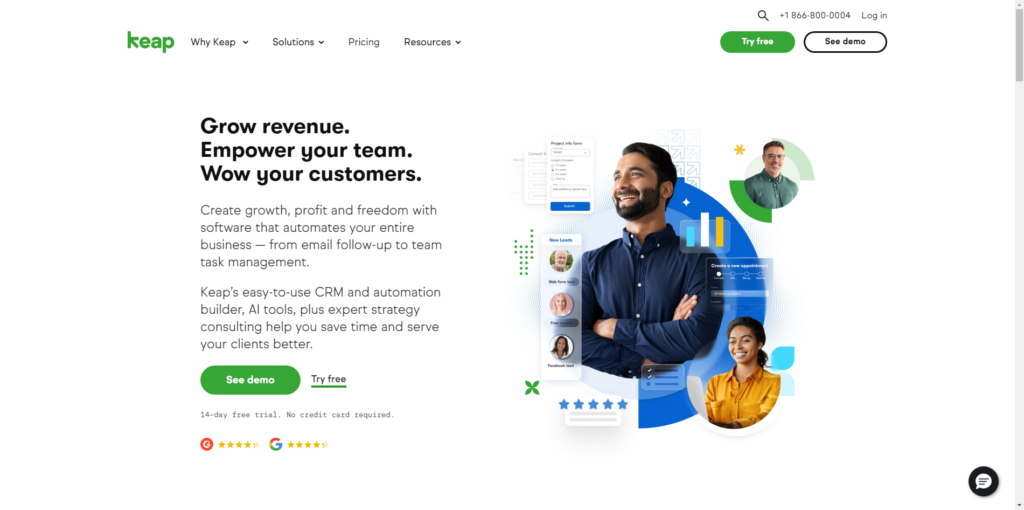
Keap is an all-in-one sales and marketing automation solution for small and medium-sized manufacturers. Keap is a direct response solution that you can use to handle the heavy lifting of sales and marketing.
Keap mentions that their “features combine CRM, marketing automation, sales automation, payments, and much more in a single, integrated platform, so you can consistently convert more clients and grow your business.”
Here’s a really important detail about Keap: Their platform works best if you’re willing to stick with them over the long term. Getting consistent value takes a lot of upfront onboarding, testing, and education. It’s a lot of work initially, but Keap’s platform produces results once you’re set.
Pros and Cons
- Automation, triggers, and autoresponder sequences
- Trigger automated follow-ups
- Monitoring prospects and customers through the sales and fulfillment lifecycle
- Highly customizable
- Robust reporting with various reporting options
- Relatively on the high-end CRM pricing spectrum
- Portions of their platform are still outdated
- Buggy or inconsistent performance
Reviews
- 4.2/5 star rating on G2 (1,527 reviews total)
- 4.1/5 star rating on GetApp (1,276 reviews total)
- 4.1/5 star rating via Capterra (1,276 reviews total)
- 8/10 score via TrustRadius (378)
- 4.4/5 star rating via Gartner (148 reviews total)
Keap Pricing
- Pro: $199 per month (2 users, 1,500 contacts)
- Max: $299 per month (3 users, 2,500 contacts)
- Ultimate: $359 per month (3 users, 2,500 contacts)
What is the Best Salesforce Alternative? Pipeline CRM Sales CRM Software
Old-economy industries have remained mostly unchanged despite rapid technological advances. Some processes have remained the same for years. This is why Salesforce isn’t always a good fit for old-economy brands; they tend to be too expensive, complex, and difficult to manage.
It’s so important to choose the sales CRM for manufacturing that best aligns with your goals. If your goal is manufacturing lead generation, choose a CRM that’s oriented around driving sales. Looking for an end-to-end solution that handles the ins and outs of global commerce? Choose a CRM that moves in that direction. Salesforce is the 800 lbs gorilla, but as we’ve seen, it’s not always the best for old economy sectors.
Consider Pipeline CRM as the number one alternative to Salesforce. Our sales CRM software has all the sales features your old economy business need, without the complex interface or technological hiccups that Salesforce often shows. Check out the industries we support, and once you’re ready tom try Pipeline CRM, sign up here to get started.
